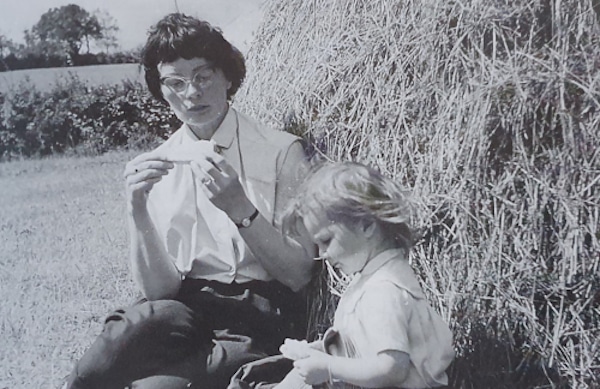Last month marked 70 years since the passing of psychiatrist, political radical, Marxist and philosopher of the Algerian Revolution, Frantz Fanon, at the young age of 36. He was born in 1925 on Martinique, a French colony from 1653.
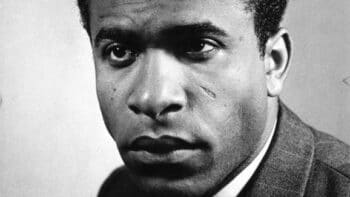 Fanon left his home in 1943 at the age of 18 to join the Free French Forces which had been established by the French government-in-exile during the Second World War to fight fascism. After the war, he studied medicine and psychiatry in Lyon, France. Having qualified as a psychiatrist in 1951, Fanon completed a psychiatric residency during which he wrote his first book, Peau noire, masques blancs (Black Skin, White Masks), an analysis of the deeply destructive psychological implications of the colonial subjugation of black people. He contextualises this analysis with the realities of his own life, writing in the Introduction:
Fanon left his home in 1943 at the age of 18 to join the Free French Forces which had been established by the French government-in-exile during the Second World War to fight fascism. After the war, he studied medicine and psychiatry in Lyon, France. Having qualified as a psychiatrist in 1951, Fanon completed a psychiatric residency during which he wrote his first book, Peau noire, masques blancs (Black Skin, White Masks), an analysis of the deeply destructive psychological implications of the colonial subjugation of black people. He contextualises this analysis with the realities of his own life, writing in the Introduction:
The attitudes that I propose to describe are real. I have encountered them innumerable times. Among students, among workers, among the pimps of Pigalle or Marseille, I have been able to isolate the same components of aggressiveness and passivity.
Fanon’s most influential work, however, came in 1961 with the publication of Les Damnés de la Terre (The Wretched of the Earth), its title taking inspiration from the first verse of “The Internationale” written by Eugène Pottier, a member of the Paris Commune. The Wretched of the Earth presents a psychological analysis and critique of the savagery and violence of colonialism on the individual, the community and the nation. It discusses the deeply traumatic impact of this brutality but also the necessity of violent resistance: “decolonisation is always a violent phenomenon”. He furthermore reflects on the collective decolonisation of communities and individuals, “the opportunity to return to the people during the struggle for freedom”.
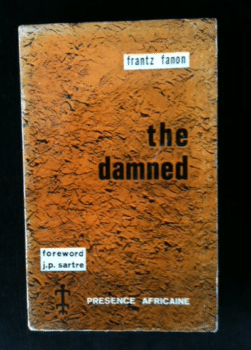 This analysis is very much rooted in Fanon’s experiences in Algeria where he initially worked in the psychiatry department of a hospital during the Algerian revolution, treating both Algerians and French soldiers as well as more broadly observing the effects of colonial violence on the human psyche. He subsequently worked with the Algerian liberation movement, Front de Libération Nationale (FLN), and in 1960 was appointed ambassador to Ghana by Algeria’s FLN-led provisional government. That same year, however, he was diagnosed with leukaemia and spent his last year of life writing The Wretched of the Earth. He died in December 1961 in the United States undergoing medical treatment.
This analysis is very much rooted in Fanon’s experiences in Algeria where he initially worked in the psychiatry department of a hospital during the Algerian revolution, treating both Algerians and French soldiers as well as more broadly observing the effects of colonial violence on the human psyche. He subsequently worked with the Algerian liberation movement, Front de Libération Nationale (FLN), and in 1960 was appointed ambassador to Ghana by Algeria’s FLN-led provisional government. That same year, however, he was diagnosed with leukaemia and spent his last year of life writing The Wretched of the Earth. He died in December 1961 in the United States undergoing medical treatment.
The Irish translator
Although Fanon’s The Wretched of the Earth is well known as a psychological analysis of the dehumanizing effects of colonization, there is little known or written about the Irish woman who translated it to English.
Constance Farrington (née Conner) was translator of the only English version of this work in circulation until 2004, when Richard Philcox produced a version for Grove Press. Her translation, published by Présence Africaine in 1963, was also the first English edition of any Fanon publication. The little we do know about Constance comes from an interview with her about the translation, published in the Irish Press (September 1963), a short article in the Irish Times one month later (October 1963), a memoir written by her first husband Brian Farrington, and ongoing research being carried out by Dr. Kathryn Batchelor of University College London (UCL) into both the life of Constance and her translation of Fanon’s seminal work. Until the publication of her former husband’s memoir (A Rich Soup with additional material, 2010: Linden Publishing), the only information available on Constance suggested that she was English and a member of the British Communist Party. Neither claim holds up to scrutiny.
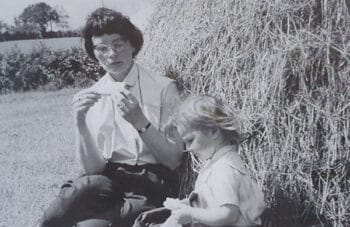 Constance Conner was from a protestant family in Cork. When just 9 years old, her mother died at the family home in Tyrone. Her father Willie – a Church of Ireland clergyman and Trinity graduate – later married Jemima, a former parishioner of his from Drumquin in County Tyrone. By the time Constance was attending college, she was living with them in a house at Mounttown Lower, Dún Laoghaire, County Dublin, while studying Modern History and Political Science at Trinity College Dublin. She subsequently worked in the university library for five years.
Constance Conner was from a protestant family in Cork. When just 9 years old, her mother died at the family home in Tyrone. Her father Willie – a Church of Ireland clergyman and Trinity graduate – later married Jemima, a former parishioner of his from Drumquin in County Tyrone. By the time Constance was attending college, she was living with them in a house at Mounttown Lower, Dún Laoghaire, County Dublin, while studying Modern History and Political Science at Trinity College Dublin. She subsequently worked in the university library for five years.
In his memoir, Brian provides valuable information on Constance’s life, how she came to translate the text as well as her political leanings. He recalls that he got to know her:
because I had joined the University dramatic society (…) She was three years older than me and, when we met, she had just got a brilliant first-class degree in history. She had never received the gold medal that her starred first should have earned her, through, I think, the inefficiency, or, more likely, the sexist prejudice, of one of her history professors, and was angry about this.
Constance married Brian Farrington in January 1953 when she was 31 years old. Having put a lot of work in to qualify as a librarian, she was less than pleased at having to give up her job after marriage, particularly when she discovered that the qualification would not be accepted in France, where she and Brian moved due to his finding employment as a teacher with the British Institute in Paris.
In France, Brian and Constance found accommodation in a “commune of left-wing people” at Châtenay-Malabry in the south-western suburbs of Paris that came to be known as La Cité Nouvelle. Brian remembers that the “only absolute rule for the acceptance by the Cité was that you had to agree with the general aims of the French Communist Party.”
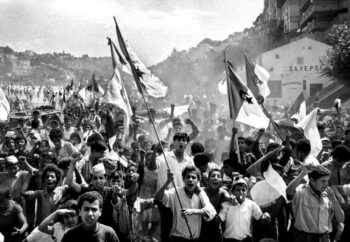 The mix of people who co-habited with the Farringtons in Châtenay, as well as the very nature of communal living, undoubtedly had an impact on the politics and worldview of Brian and Constance. They resided with journalists, bus drivers, musicians, students, painters, electricians, builders and more, who all contributed to the couple’s strong left-wing convictions, Brian noting that nothing changed in his “estimation of the truth or validity of Marx’s analysis of society”.
The mix of people who co-habited with the Farringtons in Châtenay, as well as the very nature of communal living, undoubtedly had an impact on the politics and worldview of Brian and Constance. They resided with journalists, bus drivers, musicians, students, painters, electricians, builders and more, who all contributed to the couple’s strong left-wing convictions, Brian noting that nothing changed in his “estimation of the truth or validity of Marx’s analysis of society”.
The Algerian War of Independence was brought into sharp focus for Constance and her family when she met a Frenchwoman named Micheline Pouteau who had come to live in Châtenay during the late 1950s. Micheline was involved with a left-wing underground network in France established by Francis Jeanson, the biographer of Jean-Paul Sartre, another member of the group. These activists were very critical of the French Communist Party’s weak position on Algeria and made the decision to actively assist the FLN in their resistance to French colonialism. Constance, while on a visit to Micheline who was incarcerated in La Petite Roquettei on the north side of Paris, provided her with a bunch of nylon stockings that helped Micheline and five other comrades flee the prison to freedom and over the border to Belgium.
Constance later became friendly with a French political personality, historian and journalist Charles-André Julien, to whom she gave English lessons. Julien had lived in Algeria with his family as a teenager and it was he who arranged for Constance to translate Les Damnés de la Terre by Frantz Fanon.
Patrick Lagan’s reported interview with Constance, published in the Irish Press on 16th September 1963, gives us a sense of her understanding of the conflict in Algeria from an Irish perspective:
Constance told me, she found as she read and translated this book, a sense of the familiar about it – the resemblance between Algerian freedom struggle and the Irish. Not only while the war was going on – with paras standing in for Tans – but afterwards; the outbreak of violence and civil strike sparked off by the necessary violence of the revolution itself.
The article also notes that while Constance had not been to Algeria, she “has seen the French colons, the ‘pieds noirs’ who have come to live there, seen what effect of brutally opposing emergent Algeria has had on them.”
Constance and Brian later divorced, and both remarried. Constance married a mutual friend, André Ramillon, or “Ram” for short, a primary school teacher from a small village near Orléans in France, about 100km from Châtenay. Ram had been an active participant in the French resistance against Fascism and a Communist Party member for most of his life. Brian married Olivia McMahon, a colleague from the Institute, born in France to parents from County Clare in Ireland. Both couples remained close friends, often going on holidays together to Ireland.
Coincidentally, Brian and Constance divorced at a court in Edinburgh on the same day as Edinburgh City Council erected a plaque at James Connolly’s birthplace in Cowgate, at the suggestion of the Connolly Association. Both attended the ceremony, which included performances by a brass band that had been sent over for the occasion by the Dublin Transport and General Workers Union. Brian took a photograph that day of Seán Redmond, former Secretary of the Connolly Association and brother of the late Tom Redmond, a lifelong Communist who passed away in Dublin just over six years ago.
Constance went on to teach English in one of the Grandes Écoles, l’École Centrale near Châtenay and in the 1980s received a doctorate for her research in to Paschal Grousset, a native of Corsica who had been an active member of the 1871 Paris Commune and who visited Ireland as a journalist during the summer 1886. Following his visit, Grousset published the notes he had compiled in Ireland simultaneously in English and French versions under the pseudonym Philippe Daryl (Ireland’s Disease: Notes and Impressions, 1887). In 1986, Blackstaff Press re-published this book on the centenary of Grousset’s visit under the title Ireland’s Disease: The English in Ireland and included a substantial introduction by “Constance Ramillon Conner”.
There remain gaps in our understanding of Constance’s life and work. Her son Paddy has outlined some of the political activism in which she was involved including campaigning for the left-wing Republican political party Clann na Poblachta in Dublin during the late 1940s, involvement in the 1965 protests in Paris against the escalation of the Vietnam War and membership of the General Confederation of Labour (CGT) Trade Union. However, we don’t know what contact she had, if any, with other translators or writers of decolonial and postcolonial literature such as the poet and author Aimé Césaire from Martinique, a former secondary school teacher of Fanon who, in 1950, penned Discours sur le colonialisme (Discourse on Colonialism); French-Tunisian writer Albert Memmi who passed away in 2020 at the age of 99; or translator Howard Greenfeld who produced an English version of Memmi’s Portrait du colonisé, précédé par Portrait du colonisateur (The Colonizer and the Colonized) in 1965 just two years after Constance’s work had appeared. It is unclear where precisely she was born or when she passed away, although we do know that she outlived her husband Ram who died in 1995, and that she suffered from Alzheimer’s disease in her final years.
A lucid and powerful translation
Regardless of these questions, the lasting contribution of this Irish woman to the continuing struggle for emancipation of the wretched of the earth is certainly her translation of Fanon’s masterpiece, making it accessible to the English-speaking world. It was read, for example, by republican prisoners in the cages of Long Kesh outside Belfast such as Bobby Sands, who died on Hunger Strike in 1981, and particularly influenced the intellectual debate among republicans and socialists during the post-1981 phase of conflict, evidenced by the many references to Fanon in An Phoblacht/Republican Newsover this period. Her translation is lucid and powerful and has arguably been a significant stepping stone in the thinking of other great proponents of the need for decolonisation, politically and psychologically, such as Ngũgĩ wa Thiong’o and Tomás Mac Síomóin.
Fanon’s grasp on the psychological effects of colonialism as well as the need to decolonise is presented well, as this extract shows:
The claim to a national culture in the past does not only rehabilitate that nation and serve as a justification for the hope of a future national culture. In the sphere of psycho-affective equilibrium it is responsible for an important change in the native. Perhaps we haven’t sufficiently demonstrated that colonialism is not satisfied merely with holding a people in its grip and emptying the native’s brain of all form and content. By a kind of perverted logic, it turns to the past of the oppressed people, and distorts, disfigures, and destroys it. This work of devaluing pre-colonial history takes on a dialectical significance today.
This struggle to decolonise the mind that Fanon refers to is one that applies universally to colonised peoples: the enormous effort necessary to rid the psyche of the effects of colonisation that continue to deform and debilitate, unless challenged, for a long time after the political end of such occupation. Constance Farrington understood how relevant this was to Ireland and beyond.
Luke Callinan is a Left Republican from south County Roscommon, Ireland. His main interests are Irish literature and history.

